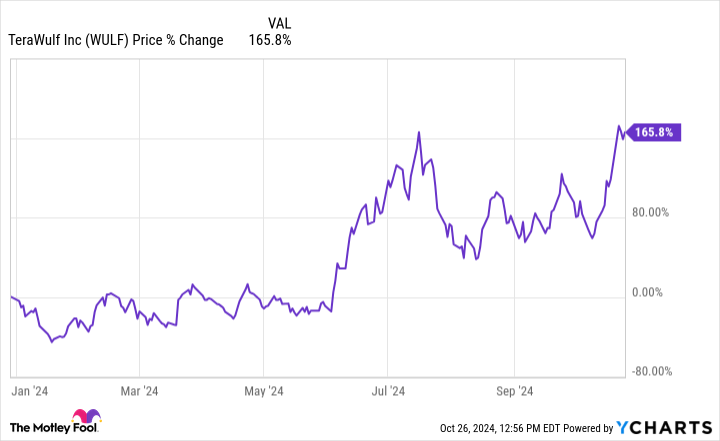A bitcoin mining company powered by 95% zero-carbon energy is transforming itself into a major AI infrastructure player just as tech giants scramble for sustainable computing power.
The artificial intelligence (AI) revolution is driving unprecedented demand for energy-intensive data centers. The International Energy Agency projects that data centers may account for up to one-third of the anticipated increase in U.S. electricity demand through 2026.
Major tech companies, like Microsoft, Amazon, and Alphabet, are racing to secure clean energy power sources, such as nuclear energy, to meet their mounting energy needs. One under-the-radar company with established renewable infrastructure is uniquely positioned to capitalize on this accelerating trend.
Image source: Getty Images.
Zero-carbon powered growth
TeraWulf (WULF 2.74%) operates Bitcoin (BTC 1.07%) mining facilities powered by approximately 95% zero-carbon energy sources, primarily hydroelectric power. The company’s revenue surged 130% year over year to $35.6 million in the second quarter of 2024, driven by an 80% increase in operational mining capacity and higher Bitcoin prices.
Moreover, TeraWulf has significantly strengthened its financial position by eliminating its debt ahead of schedule. This clean balance sheet positions TeraWulf to fund its ambitious expansion plans in both cryptocurrency mining and AI infrastructure.
Strategic pivot to AI infrastructure
TeraWulf is leveraging its existing clean energy infrastructure to enter the high-performance computing and AI market. The company has already completed a 2.5 megawatt (MW) proof-of-concept project designed for next-generation graphics processing unit (GPU) technology.
Additionally, construction is underway on a 20 MW colocation facility engineered to support AI workloads. The facility includes advanced features, like liquid cooling and redundant power systems typical of premium data centers. It is scheduled to kick off operations in Q1 2025, according to the company.
Strong financial backing
TeraWulf recently secured $425 million through a convertible note offering at a reasonable 2.75% interest rate, reflecting strong institutional investor confidence. The company plans to use these funds for strategic acquisitions and the expansion of data center infrastructure to support its AI computing initiatives.
Furthermore, TeraWulf’s board recently authorized a $200 million share repurchase program through December 2025, signaling management’s belief that the stock may be undervalued despite rising approximately 165% year to date.
Infrastructure advantage
TeraWulf’s clean energy resources give it a unique edge in the rapidly growing AI infrastructure market. Major tech companies are actively seeking sustainable power sources for their energy-intensive AI operations, making TeraWulf’s zero-carbon data centers particularly attractive.
Wall Street anticipates this strategic advantage will fuel TeraWulf’s growth, projecting revenue to increase 214% through 2025 as the company expands from Bitcoin mining into AI computing services. The timing appears ideal, as demand for sustainable data center capacity continues to outpace available supply.
Risk considerations
TeraWulf’s core bitcoin mining business faces significant challenges, as evidenced by the April 2024 reward halving, which significantly impacted miners’ profitability. This vulnerability to cryptocurrency market dynamics highlights why the company is diversifying into AI infrastructure.
While promising, the pivot to AI computing comes with its own risks. TeraWulf must prove it can convert its Bitcoin mining expertise into successful partnerships with major tech companies. The company’s ability to operate reliable, high-performance data centers at scale is also a work in progress.
Time to Buy?
The case for buying TeraWulf largely rests on whether you believe the company can successfully transform its zero-carbon Bitcoin mining operations into a thriving AI infrastructure business. While the company has removed key investment risks by eliminating debt and raising substantial capital, it remains early in this transition.
For investors convinced that AI’s growing energy needs will drive demand for sustainable data centers, TeraWulf could offer a significant upside at current prices. However, given the execution risks in this transformation, any position should be sized as a speculative portion of a diversified portfolio.
John Mackey, former CEO of Whole Foods Market, an Amazon subsidiary, is a member of The Motley Fool’s board of directors. Suzanne Frey, an executive at Alphabet, is a member of The Motley Fool’s board of directors. George Budwell has positions in Microsoft. The Motley Fool has positions in and recommends Alphabet, Amazon, Bitcoin, and Microsoft. The Motley Fool recommends the following options: long January 2026 $395 calls on Microsoft and short January 2026 $405 calls on Microsoft. The Motley Fool has a disclosure policy.


